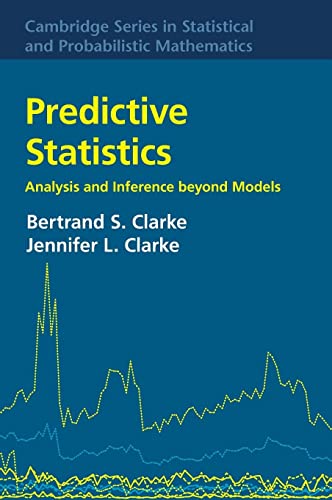Predictive Statistics: Analysis and Inference beyond Models (Cambridge Series in Statistical and Probabilistic Mathematics, Series Number 46) - Hardcover
Book 35 of 46: Cambridge Series in Statistical and Probabilistic Mathematics
Synopsis
All scientific disciplines prize predictive success. Conventional statistical analyses, however, treat prediction as secondary, instead focusing on modeling and hence estimation, testing, and detailed physical interpretation, tackling these tasks before the predictive adequacy of a model is established. This book outlines a fully predictive approach to statistical problems based on studying predictors; the approach does not require predictors correspond to a model although this important special case is included in the general approach. Throughout, the point is to examine predictive performance before considering conventional inference. These ideas are traced through five traditional subfields of statistics, helping readers to refocus and adopt a directly predictive outlook. The book also considers prediction via contemporary 'black box' techniques and emerging data types and methodologies where conventional modeling is so difficult that good prediction is the main criterion available for evaluating the performance of a statistical method. Well-documented open-source R code in a Github repository allows readers to replicate examples and apply techniques to other investigations.
"synopsis" may belong to another edition of this title.
About the Authors
Bertrand S. Clarke is Chair of the Department of Statistics at the University of Nebraska, Lincoln. His research focuses on predictive statistics and statistical methodology in genomic data. He is a fellow of the American Statistical Association, serves as editor or associate editor for three journals, and has published numerous papers in several statistical fields as well as a book on data mining and machine learning.
Jennifer Clarke is Professor of Food Science and Technology, Professor of Statistics, and Director of the Quantitative Life Sciences Initiative at the University of Nebraska, Lincoln. Her current interests include statistical methodology for metagenomics and prediction, statistical computation, and multitype data analysis. She serves on the steering committee of the Midwest Big Data Hub and is co-PI on an award from the NSF focused on data challenges in digital agriculture.
"About this title" may belong to another edition of this title.
Search results for Predictive Statistics: Analysis and Inference beyond...
Predictive Statistics
Seller: Books Puddle, New York, NY, U.S.A.
Condition: New. Seller Inventory # 26375628239
Predictive Statistics
Seller: Majestic Books, Hounslow, United Kingdom
Condition: New. Seller Inventory # 370417168
Buy New
Ships from United Kingdom to U.S.A.
Quantity: 1 available
Predictive Statistics : Analysis and Inference Beyond Models
Seller: GreatBookPrices, Columbia, MD, U.S.A.
Condition: New. Seller Inventory # 30336278-n
Predictive Statistics: Analysis and Inference beyond Models (Cambridge Series in Statistical and Probabilistic Mathematics, Series Number 46)
Seller: Lucky's Textbooks, Dallas, TX, U.S.A.
Condition: New. Seller Inventory # ABLIING23Mar2317530264307
Predictive Statistics: Analysis and Inference beyond Models (Cambridge Series in Statistical and Probabilistic Mathematics, Series Number 46)
Seller: California Books, Miami, FL, U.S.A.
Condition: New. Seller Inventory # I-9781107028289
Predictive Statistics
Seller: Biblios, Frankfurt am main, HESSE, Germany
Condition: New. Seller Inventory # 18375628229
Buy New
Ships from Germany to U.S.A.
Quantity: 1 available
Predictive Statistics : Analysis and Inference Beyond Models
Seller: GreatBookPrices, Columbia, MD, U.S.A.
Condition: As New. Unread book in perfect condition. Seller Inventory # 30336278
Predictive Statistics (Hardcover)
Seller: Grand Eagle Retail, Bensenville, IL, U.S.A.
Hardcover. Condition: new. Hardcover. All scientific disciplines prize predictive success. Conventional statistical analyses, however, treat prediction as secondary, instead focusing on modeling and hence estimation, testing, and detailed physical interpretation, tackling these tasks before the predictive adequacy of a model is established. This book outlines a fully predictive approach to statistical problems based on studying predictors; the approach does not require predictors correspond to a model although this important special case is included in the general approach. Throughout, the point is to examine predictive performance before considering conventional inference. These ideas are traced through five traditional subfields of statistics, helping readers to refocus and adopt a directly predictive outlook. The book also considers prediction via contemporary 'black box' techniques and emerging data types and methodologies where conventional modeling is so difficult that good prediction is the main criterion available for evaluating the performance of a statistical method. Well-documented open-source R code in a Github repository allows readers to replicate examples and apply techniques to other investigations. Aimed at statisticians and machine learners, this retooling of statistical theory asserts that high-quality prediction should be the guiding principle of modeling and learning from data, then shows how. The fully predictive approach to statistical problems outlined embraces traditional subfields and 'black box' settings, with computed examples. Shipping may be from multiple locations in the US or from the UK, depending on stock availability. Seller Inventory # 9781107028289
Predictive Statistics: Analysis and Inference beyond Models (Cambridge Series in Statistical and Probabilistic Mathematics, Series Number 46)
Seller: Ria Christie Collections, Uxbridge, United Kingdom
Condition: New. In. Seller Inventory # ria9781107028289_new
Buy New
Ships from United Kingdom to U.S.A.
Quantity: Over 20 available
Predictive Statistics : Analysis and Inference Beyond Models
Seller: GreatBookPricesUK, Woodford Green, United Kingdom
Condition: New. Seller Inventory # 30336278-n
Buy New
Ships from United Kingdom to U.S.A.
Quantity: Over 20 available
